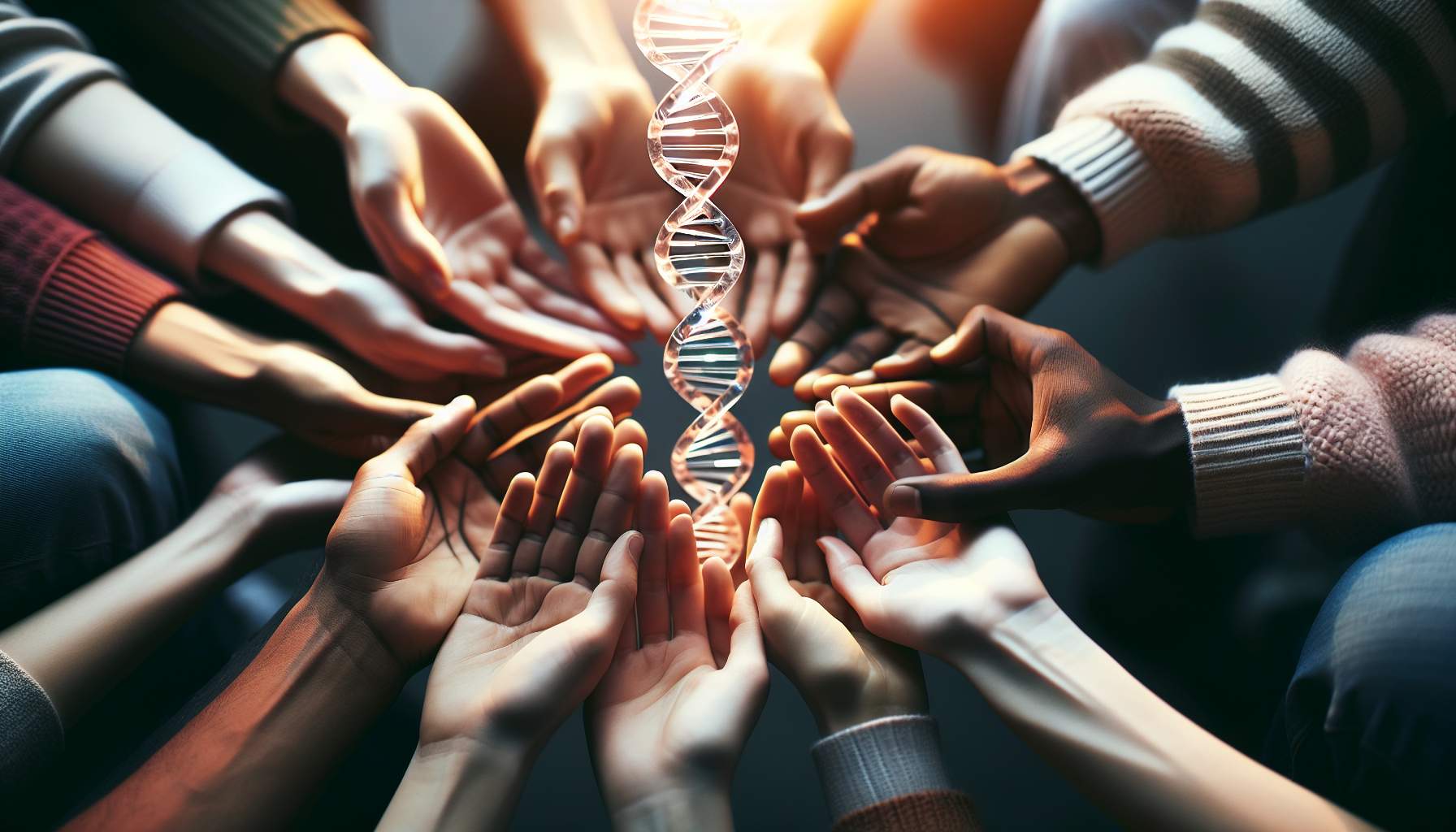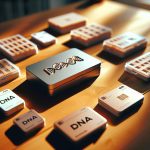Many adoptees embark on a journey to unearth their roots and connect with their biological kin. This quest, packed with emotional highs and lows, also brings up concerns about the privacy and reliability of the information obtained. Having explored several DNA testing kits myself, I’ve pinpointed those that stand out for their commitment to safeguarding user data, the breadth of their genetic databases, and their user-friendly nature – all critical aspects for adopted individuals seeking answers.
At the pinnacle of my recommendations sits AncestryDNA. It shines due to its vast database that significantly betters your chances of finding blood relatives. Furthermore, it provides detailed analyses of one’s ethnic background while ensuring users have a say in how their personal data is handled. This combination makes AncestryDNA an exceptional choice for anyone looking to trace their biological heritage with peace of mind.
Best DNA Test Kits for Adoptees When You’re Pressed for Time
When it comes to delving into your roots and understanding more about where you come from, AncestryDNA stands out. It boasts a massive collection of over 18 million samples, significantly enhancing the chances of finding relatives. Additionally, it offers access to historical records at a reasonable cost.
If you’re on the hunt for an even more budget-friendly option without compromising quality, MyHeritage has got you covered. It’s known as the most economical DNA kit available, often featuring discounts that make it incredibly accessible. This kit not only connects you with long-lost relatives but also lets you dive deep into your ethnic background.
LivingDNA takes a slightly different approach by combining ancestry information with health insights. If understanding how your DNA influences your health interests you, their combined package is worth considering.
For those specifically looking to reconnect with biological family members, 23andMe is highly recommended due to its extensive user database that facilitates these connections effortlessly.
Meanwhile, FamilyTreeDNA excels in helping individuals trace their maternal or paternal lineage separately or together while offering robust tools for building out one’s family tree and optional insights into personal health based on genetic makeup.
Lastly, for anyone eager to gain a comprehensive view of their genetic blueprint,Nebula Genomics steps up by providing whole genome sequencing. This method uncovers detailed information regarding ethnicity, ancestry traits and much more than what typical tests offer.
In summing up these options:
– AncestryDNA emerges as the top pick because of its large database.
– MyHeritage scores high marks for affordability and rich features.
– LivingDNA combines ancestry data with health reports.
– 23andMe is ideal for adoptees searching for blood relations.
– FamilyTreeDNA caters wonderfully to those interested in detailed lineage tracing.
– Nebula Genomics offers depth in genetic exploration through whole genome sequencing.
Choosing between these services depends largely on what aspects of your genetics interest you most—whether it’s connecting with relatives, exploring ethnic backgrounds or understanding potential health predispositions. Each service provides unique benefits tailored to different needs and curiosities about one’s ancestry and heritage.
Top DNA Testing Kits for Adopted Individuals: An Overview
Top DNA Test Kit for Discovering Your Biological Relatives
Embarking on a journey to uncover your roots can be thrilling, and AncestryDNA stands out as the perfect companion for adoptees craving to piece together their biological lineage. With an impressive collection of 18 million DNA samples, this platform significantly boosts your chances of finding family connections. The vastness of its database acts as a beacon, guiding you closer to relatives you’ve yet been acquainted with.
What sets AncestryDNA apart is not just its ability to reconnect families but also its commitment to unraveling the tapestry of your ethnic heritage. It meticulously divides your genetic code into specific regions, painting a picture of where you come from. This insight opens doors, serving as a cornerstone in the quest for self-discovery and familial ties.
Privacy concerns? They’ve got it covered. You hold the reins when it comes to who gets a peek at your results or how they’re used. This aspect instills confidence, ensuring that your journey towards finding family remains under wraps until you decide otherwise.
Moreover, navigating through complex genetic information is made effortless thanks to AncestryDNA‘s user-friendly interface. It’s designed for simplicity, making the daunting task of decoding DNA an enjoyable venture rather than a cumbersome chore.
In essence, kick-starting this adventure with AncestryDNA could be the key to unlocking answers about your origins and building bonds that were once considered lost.
MyHeritage: Budget-Friendly DNA Testing for Adopted Individuals
Embarking on a journey to discover your roots and connect with biological relatives has been simplified thanks to MyHeritage. This platform stands out not only because it’s more wallet-friendly compared to its competitors, but also for its robust database that promises fruitful searches without breaking the bank. The essence of this service is captured in several key features designed to make your quest both enriching and straightforward.
At the heart of MyHeritage is an innovative feature that aids in finding potential family members. This tool doesn’t just throw names at you; it smartly prioritizes results based on how likely these individuals are related to you, streamlining your search efforts significantly. Adding a personal touch, the service allows you to animate your familial connections through photos, videos, and music, turning your family tree into a vivid story rather than a static chart.
The process begins with something as simple as a saliva swab—a small step for significant revelations. Within 3-4 weeks, results are ready, unlocking doors to past generations and new relations alike.
Another pillar supporting user satisfaction is privacy. Knowing that searching for kin can be a sensitive voyage, MyHeritage places great emphasis on confidentiality controls. Users have full command over who views their information—peace of mind ensuring that explorations remain secure from unwarranted scrutiny.
Ease of use cannot be overstated when dealing with sophisticated genealogical tools; thus, MyHeritage prides itself on an intuitive interface. It ensures anyone’s dive into ancestry research feel less like navigating through murky waters and more like embarking on an enlightening adventure. Features are easily accessible without getting lost in technical speak or labyrinthine menus.
In wrapping up the initiation process with MyHeritage, it becomes clear why so many turn towards this platform for uncovering their genetic heritage and forming tangible connections with their lineage: affordability meets functionality—all while keeping user experience and security at the forefront.
LivingDNA: Discover Your Heritage and Health Details Through Your DNA
Dive into a journey of self-discovery with LivingDNA, where tracing your roots and understanding health predispositions becomes an enlightening adventure. This platform stands out by blending the exploration of your ancestry with valuable health insights. For anyone adopted, this dual approach is especially significant, offering a path to connect with biological relatives while uncovering inherited health aspects.
What makes LivingDNA remarkable is its Family Networks feature. By analyzing your DNA, it crafts potential family trees, making it easier to identify and reach out to relatives who’ve also used the service. It’s like having a detective at your fingertips who specializes in piecing together family puzzles using genetic clues.
Privacy concerns? They’ve got you covered. The platform ensures users have full control over their personal data, allowing searches for kin without sacrificing confidentiality. Plus, its user-friendly interface guarantees that navigating through heaps of ancestral and health information feels like a breeze rather than a chore.
Kickstart this insightful exploration with just a simple saliva sample and gear up for revelations within 6-8 weeks. With LivingDNA, stepping into the world of genetics isn’t just about learning where you come from—it’s about embracing what makes you uniquely you, both in terms of lineage and well-being.
23andMe: A vast database for finding family members easily
Diving into what makes you, well, you has never been easier thanks to 23andMe. This nifty service digs deep into your DNA, mapping it against a wide array of global populations and pinpointing where your ancestors might have walked the earth. It’s like having a history book of your very own genetics, revealing not just where you come from but also hinting at some traits that make you unique. Ever wondered if ancient Neanderthals are part of your family tree? You’re in luck because this test can tell you that too!
For folks who’ve been adopted, 23andMe goes beyond mere curiosity—it offers a bridge to their biological past through its DNA Relative Finder feature. Imagine finding out that you have cousins, or even siblings, out there! By matching your DNA with others in its vast database, the service opens up the possibility of connecting with blood relatives for those on a journey to discover their roots.
But there’s more than just meeting long-lost family members. The Ancestry Composition report slices and dices your genetic background by region. It’s like getting a personalized map showing exactly where your forbears hailed from—a powerful tool for anyone trying to piece together their cultural identity.
Health-wise, adoptees often face hurdles since medical histories can be hard to come by. Here’s where 23andMe steps in again with its Health Predisposition report. This part of the service lays bare any potential health risks lurking in your genes, empowering you with knowledge so you can take charge of your well-being preemptively.
Lastly, let’s talk about going way back—wayyy back—with the Maternal and Paternal Haplogroups analysis. This cool feature traces lineage thousands of years into the past, unveiling migration patterns and offering incredible insights into distant ancestral origins.
Getting started with 23andMe opens up a world filled with discovery about yourself and provides an anchor for those seeking connections to their beginnings while arming them with vital information for navigating future health decisions. It’s not just about knowing where you came from; it’s about understanding who you are now because of it.
Discover Your Ancestry Through Maternal and Paternal Lines with FamilyTreeDNA
Embarking on a journey to uncover your roots, FamilyTreeDNA steps in as your guide, offering a bridge to the past through its advanced DNA testing services. Tailored specifically for those curious about their heritage or adoptees eager to connect with their biological origins, this platform is distinguished by its focus on both maternal and paternal ancestries.
With a straightforward sample collection process involving just a saliva swab, you dive into the exploration of your lineage within 6-8 weeks. The beauty of FamilyTreeDNA lies in its precision—separating mtDNA and Y-DNA tests to meticulously trace your mother’s and father’s lines respectively. This division not only sharpens the search but also enhances the possibilities of pinpointing direct relatives.
Understanding the value of privacy in such personal quests, FamilyTreeDNA empowers you with complete control over your genetic data. Whether it’s embracing newfound connections by sharing information with potential relatives or safeguarding your privacy by keeping details under wraps—the choice remains firmly yours.
Navigating through this voyage is made effortless thanks to an intuitive interface designed with clarity at its core. It strips away complexities, allowing you to effortlessly access specific tests that pave the way towards discovering your familial bonds.
In essence, FamilyTreeDNA serves as more than just a tool; it’s a companion on your quest for self-discovery. By focusing on distinct maternal and paternal lines while ensuring user control every step of the way, it stands out as a beacon for anyone yearning to unearth their family history while cherishing privacy and ease-of-use above all else.
6. Nebula Genomics: Complete DNA Analysis for In-depth Heritage Details
Embarking on a journey to uncover your roots and connect with your biological heritage has never been easier, thanks to Nebula Genomics. With its cutting-edge whole genome sequencing technology, this platform stands out by offering insights that go beyond the surface level. Whether you’re an adoptee eager to find familial connections or someone curious about their ancestry, Nebula Genomics offers a comprehensive lens through which to view your lineage.
At the heart of its service is a straightforward saliva swab test. After submitting your sample, expect to receive results within 8-10 weeks. These findings are not just numbers and names; they are keys unlocking the doors to your past, tracing both maternal and paternal lines with astonishing precision.
What really sets Nebula Genomics apart is its meticulous attention to privacy. In today’s digital age, safeguarding personal data is paramount. Recognizing this, Nebula allows you full control over who sees your genetic information. You decide if you want it kept private or shared with individuals you trust—a feature that adds peace of mind to the already exciting exploration of your genetic makeup.
Navigating through complex genomic data might sound daunting, but Nebula makes it effortless. Its user-friendly interface breaks down sophisticated information into digestible bits, empowering you with knowledge without overwhelming you.
So why wait? Dive into the depths of your ancestry with Nebula Genomics. Uncover stories woven into your DNA and possibly even connect with long-lost relatives—after all, every discovery brings you closer to understanding who you are and where you come from.
Guidance for Adoptees on Selecting the Ideal DNA Test Kit
When embarking on the journey to uncover biological roots as an adoptee, choosing the right DNA kit becomes a pivotal step. The decision hinges on several critical factors that enhance the likelihood of forging connections with genetic kin.
First off, size matters — specifically, the size of the DNA database. A sprawling database significantly boosts your odds of hitting a match. It’s akin to fishing in a well-stocked pond versus a scanty puddle; more fish increase your chances of a good catch.
The tools provided for family matching cannot be overlooked. These features are your compass in navigating through potential relatives, helping you sort and identify them with precision and speed. It’s like having Sherlock Holmes by your side, sifting through clues to piece together your familial puzzle.
In this pursuit, privacy shouldn’t take a back seat. Considering the personal nature and emotional stakes involved in tracing biological families, how well your data is guarded is paramount. Opting for kits that give you control over who sees what about you ensures peace of mind amid sensitive searches.
Don’t underestimate the value of bells and whistles either; additional perks such as insights into health or lineage specifics can be surprisingly helpful. They’re not just icing on the cake but could provide key pieces to understanding where you come from on a deeper level.
Lastly, ease does it when it comes to usability — no one wants to navigate through a labyrinthine process filled with technical jargon and complex procedures just to start their journey home.
In summing up these pointers, zeroing in on a DNA kit that aligns with these aspects can dramatically steer adoptees toward successfully uncovering their biological heritage — making an informed choice means getting closer to piecing together one’s origins story.
Handling Privacy Worries
If you’re searching for your biological family, keeping things under wraps is a top priority. Plenty of options out there let you control who sees what, ensuring your secrets stay safe. Look out for those that offer tight security measures like two-step verification to keep snoops at bay.
Grasping the Concept of Ethnic Background Projections

Discovering your roots just got easier with services like AncestryDNA and Nebula Genomics. They delve deep into your DNA to pinpoint your ethnic background, shining a light on the origins of your biological family. This is especially handy for those who start their journey without much knowledge about their lineage.
Why Keeping Current Matters
As the number of individuals opting for genetic testing escalates, the corresponding databases swell in size. This expansion enhances the algorithms used to analyze data, thereby enriching the insights available to users. Such developments might pave the way for discovering previously unknown relatives or provide a more nuanced understanding of one’s ethnic origins. The presence of robust online communities around certain testing kits plays a pivotal role in this context. These forums not only foster interaction among users but also serve as fertile grounds for receiving periodic updates. These updates are invaluable as they can significantly augment one’s genealogical exploration by integrating new findings and interpretations into their personal narratives, ensuring that your journey into ancestry research remains both enlightening and up-to-date.
Employing External Tools
Interested in diving deeper into your genetic heritage? The digital era offers you some intriguing options. Platforms like GEDmatch are at the forefront, providing a unique service. They allow individuals to upload their raw DNA information obtained from various testing services. This process essentially broadens the horizon for those on a quest to connect with their biological relatives, by comparing their data against an extensive array of other users’ DNA.
However, it’s crucial to pause and consider privacy concerns before taking this step. Each time you decide to use such third-party platforms, making an informed decision is key. It’s recommended to thoroughly go through their privacy terms and understand what you’re signing up for.
By doing so, you not only stand a better chance of uncovering family connections but also ensure that your personal information remains protected. Remember, in the realm of genetics and online databases, knowledge is power, both in understanding your roots and safeguarding your privacy.
Fast Overview: Top DNA Testing Options for Adopted Individuals
If you’re in the market for a DNA kit, deciding which one to pick can feel like navigating a maze. Luckily, we’ve got the lowdown on what’s out there to help simplify your decision process. Here’s the skinny on some of the top contenders and what they bring to the table.
Leading the pack is AncestryDNA, with its massive 18 million-strong database. It’s not just about numbers; this kit offers ethnicity estimates alongside family matching options, all while keeping your data under lock and key. Priced at €91.24, it’s an investment in uncovering where you come from.
Not far behind is MyHeritage. With a 6.5 million database, it might seem like a step down but don’t let that fool you. This kit excels in ranking your matches within its family matching feature and maintains equally stringent privacy measures, all for €82.02.
For those who are curious about their health as well as their ancestry, LivingDNA fits the bill perfectly. Though it sports a smaller crowd with only 300,000 in its database and lacks family matching capabilities, it stands out by offering insights into both health and ancestry at €82.94.
23andMe comes with a hefty price tag of €211.05 but backs it up by providing detailed reports on both ancestry and health from its 13.6 million database, plus yes to family matching! The privacy here is top-notch too.
If tracing back maternal or paternal lineage is more up your alley, FamilyTreeDNA makes that happen with its specialized tests alongside traditional family matching features from a pool of 2 million profiles—all secured tightly—for €72.81.
Lastly,< strong>Nebula Genomics< /strong>might appear as an underdog due to its relatively small database size (specifics weren’t available). Still, if whole genome sequencing piques your interest over mere ethnic breakdowns or familial connections—without sacrificing privacy—then its higher price point of €229.48 could be worth every penny.
Each option has something unique up its sleeve whether you’re after extensive databases for finding long-lost relatives or more intricate details concerning your health linked to genetics—all without throwing caution regarding personal data security to the wind.
Find the Top DNA Testing Kit for Adopted Individuals
Selecting the ideal DNA test kit is crucial for adoptees on the quest to uncover their biological roots. A top-notch kit can unravel your ancestry, connect you with potential kin, and ensure your information stays protected. These benefits are particularly vital for those piecing together their family history.
After considerable evaluation, AncestryDNA emerges as the leading choice for adoptees. Its expansive database significantly boosts your chances of identifying relatives. Coupled with robust privacy safeguards and straightforward breakdowns of ethnic backgrounds, it stands out as a highly effective tool tailored to meet the specific requirements of adoptees aiming to discover their biological family connections.
Common Questions About Top DNA Tests for Adopted Individuals
What to Consider in a DNA Test Kit for Adoptees
When you’re on the hunt for your biological roots, prioritizing a few key aspects can make all the difference. Dive into platforms boasting vast databases to cast a wider net. The ability to match with relatives is a game-changer, so look out for that feature. Privacy isn’t something to skimp on either; ensure your info remains under lock and key. Perks like health insights or the ability to trace your lineage add extra spice to the quest. And let’s not forget, simplicity is king, an interface you can navigate without pulling your hair out is crucial. By focusing on these points, unlocking the door to your past becomes less of a wild goose chase and more of a straight shot home, all while keeping your personal data safe and sound.
How Reliable are DNA Comparisons?
Kits for identifying familial connections, especially when it comes to immediate family members like moms, dads, or brothers and sisters, usually hit the mark. To put this theory to the test, I compared the results from these kits with family ties I already knew about. It turns out they’re pretty spot-on!
Is AncestryDNA the Top Option for Adopted Individuals?
From my experience, AncestryDNA tops the chart for adoptees looking to dive into their roots. It boasts a vast user base and robust privacy settings, ensuring a safe search journey. Plus, it nails down your ethnic background with impressive accuracy.
Privacy Concerns with DNA Testing Kits
It’s crucial to keep privacy front and center, particularly for adoptees navigating tricky family dynamics. Opt for a kit that offers robust privacy controls, ensuring you have the say in who gets access to your information and its application.
How to Utilize the Findings to Locate My Blood Relatives?
After receiving your results, tap into the family matching and sorting tools to spot possible kin. Then, it’s all about making contact with those matches to kindle a connection and maybe unearth your biological roots.
Is It Possible to Obtain Both Genealogy and Wellness Details?
LivingDNA kits are a two-in-one deal, diving into both your roots and health trends. If you’re curious about hereditary health issues in your family tree, these kits are right up your alley.






![DNA Glossary: Key DNA Definitions to Know [2024 Update] – Your Guide to Navigating the Complex World of Genetics 2024 DNA Glossary: Unlock the Secrets of Genetics](https://www.musterr.com/wp-content/uploads/2024/03/2024-dna-glossary-unlock-the-secrets-of-genetics-1709502590-150x150.jpg)













